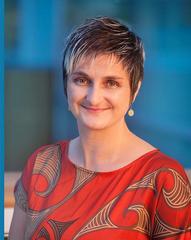
Hana O’Regan is the newly appointed General Manager of Oranga/ Wellbeing for Te Rūnanga o Ngāi Tahu. Hana previously held the positions of Director Māori & Pasifika and Director Student Services at The Christchurch Polytechnic Institute of Technology, CPIT. Hana’s career has been largely focused on the areas of Māori language revitalisation and Māori educational achievement whilst also being an active advocate and driver for her own tribal language revitalisation strategy within Kāi Tahu. Hana has held positions as the Manager of the Māori Language Unit of the Ngāi Tahu tribal organisation, lecturer at the University of Otago, Lecturer, Head of School and and Faculty Dean at CPIT.
She has also held a number of memberships on national and local boards, advisory groups and review panels including the Māori Language Commission and Te Paepae Motuhake, and ENZ – Endometriosis New Zealand.
Hana is also currently a New Zealand Fellow on the International Centre for Language Revitalisation, ICLR.
Nathans's research interest is the workings of the human brain, and Hana is completing her PhD on language revival methodologies for te reo Kai Tahu. While these have some overlap (it is the brain that acquires the ability to korero after all!) Nathan and Hana intend to use this keynote address to explore the concept of Tuakana/Teina (loosely translated here as peer support/mentoring). How does the concept of rakatirataka (leadership/excellence/role modelling) and cultural empowerment inform our understanding of the role of mentor and the concept of Tuakana/Teina? How is this reinforced and understood from a brain development/neuroscientific perspective?

Nathan Wallis is a father of three & foster parent with a professional background in child counselling, teaching and social service management. Until recently he lectured in Human Development at the University of Canterbury, Christchurch, New Zealand and was also a board member and senior trainer with the highly respected Brainwave Trust. In 2010 he founded a private training consultancy, Nathan Wallis Ltd, with the goal of facilitating easy to understand professional development training reflect-ing the latest neuroscience discoveries and their practical implications for everyday practice. Since then he has been in hot demand, delivering in excess of 150 presentations every year throughout New Zealand and Australia. He has developed a reputation as a lively and engaging speaker who uses humour and plain language to make this complex topic come to life.
Nathans's research interest is the workings of the human brain, and Hana is completing her PhD on language revival methodologies for te reo Kai Tahu. While these have some overlap (it is the brain that acquires the ability to korero after all!) Nathan and Hana intend to use this keynote address to explore the concept of Tuakana/Teina (loosely translated here as peer support/mentoring). How does the concept of rakatirataka (leadership/excellence/role modelling) and cultural empowerment inform our understanding of the role of mentor and the concept of Tuakana/Teina? How is this reinforced and understood from a brain development/neuroscientific perspective?
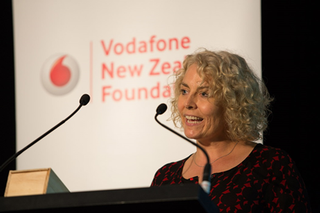
Dr Pat Bullen is a Senior Lecturer in youth development in the School of Learning, Development and Professional Practice in the Faculty of Education at The University of Auckland. Her research and teaching focus on the factors that contribute to thriving during adolescence, particularly during times of transition. Central to Pat’s work is how research can be applied to enhance the human condition, by informing policy and practice. In 2014, Pat was the first academic to be awarded the Vodafone World of Difference Fellowship. The purpose of the Fellowship is to develop leaders in the youth health and development sector, with a particular focus on meaningfully engagement in learning.
The main objective of Pat’s Fellowship was to enhance the quality and reach of youth mentoring in Aotearoa New Zealand, by linking youth mentoring with tertiary institutions, improving networking and communication within the sector and developing evidence-based practice.
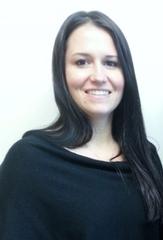
Dr Kelsey Deane, PhD is a Lecturer in the School of Counselling, Human Services and Social Work, Faculty of Education and Social Work at the University of Auckland. Her major research interests include positive youth development, youth mentoring and program evaluation. Kelsey is interested in research that both advances the cumulative knowledge base in these dynamic fields and directly informs quality youth service provision.
She enjoys working in partnership with organisations to co-design programme evaluations, including the theories of change and outcome evaluations. She is currently leading an observational research project focused on the dynamics of adult-youth mentoring relationships to better understand how specific relationship interactions can either help or hinder young people’s psychosocial development and wellbeing.
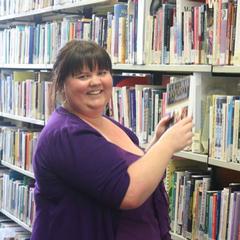
Hilary Dutton has recently completed her MA in Education at the University of Auckland. Following her own experience as a youth mentor, Hilary has completed two postgraduate research projects focused on both the theory and practice of youth mentoring. She is currently pursuing doctoral studies to further her knowledge, interest, and contribution to youth mentoring in New Zealand and internationally, as well as working as a research co-ordinator for a longitudinal project examining adult-youth partnerships.
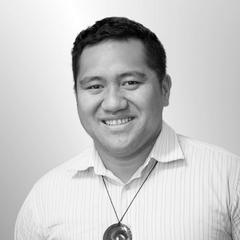
Michael Moka is the young and engaging founder of Indigenous Growth Limited (www.indigenousgrowth.com) – a new organisation with a quadruple bottom line - which feeds his passion to empower families like his to get themselves out of the poverty cycle. Building a strong foundation is the most powerful way of retaining long term growth.
Since 2005 he has chosen a specialised path dedicated to this goal of serving his family and families like his. Indigenous Growth takes a culturally diverse approach, building their people from the grassroots level to provide a more diverse and profitable culture for all organisations.
Michael holds a number of governance and advisory roles for Whanau Organisations, Charities, Learning Institutions and Not for Profit organisations.
Michael speech is titled: hara taku toa I te toa takitahi - My success is not because of me alone
He will share his story around his experience of being mentored:
- How the mentor played the role to shatter limiting beliefs
- How the mentor was different and the same
- How mentors can play a role that no one in their whanau can
He is hoping to provide some insights on how we can enhance the well being of our youth so they can have the Mana (Power and Authority) to achieve their goals.
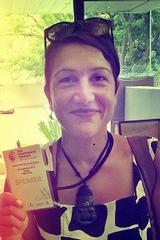
Anya is Executive Officer at Ara Taiohi, peak body for youth development in New Zealand. Ara Taiohi are working to promote and champion the value of the work that happens around the country with young people using the principles of youth development, and by the end of the year will have established a professional body for youth workers of all shapes and sizes! Most of Anya's work over the last 20 year has been in secondary schools across New Zealand and in London. She brings a fierce belief in cross sectoral innovation, collaboration and the need to build common ground, as we work together to create the conditions for our young people to grow into thriving, connected and hopeful members of our communities, democracy and economy.
Anya will discuss the state of youth development in New Zealand in 2016. She will present international and national perspectives on where we're at, gathered through Ara Taiohi's international advocacy and work at a national level to connect the sector, raise the standards, champion youth development and promote sustainability.
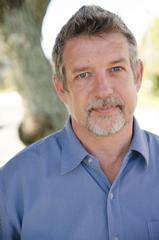
Dave has worked as Projects and Strategy Manager at The Tindall Foundation for 8 years, where he manages relationships with a number of the foundation’s key initiatives, including support for the Canterbury earthquakes recovery process, and significant youth employment partnerships with Auckland Council and Counties Manukau DHB. He also manages the foundation’s application processes.
Previous roles in New Zealand included leading a multi-agency community safety partnership and co-ordinating a regional youth workers’ network.
Before migrating to New Zealand in 2002, Dave lived in inner-city Bristol, UK, for 25 years, where he worked on a diverse range of initiatives including:
He now enjoys the opportunities to support and co-create positive social change through his work for The Tindall Foundation.
Dave will discuss The Tindall Foundation's approach to youth development funding and collaboration and share ideas for achieving long term sustainability.
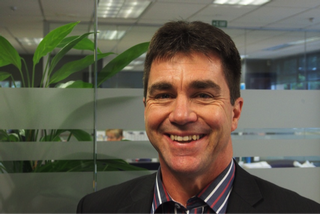
Murray Edridge is the Deputy Chief Executive, Community Investment at the Ministry of Social Development.
In this role Murray oversees the Ministry’s purchasing of social services for vulnerable children, young people and adults, as well as moving the social sector to a results-focused and evidence-based purchasing strategy. He leads programmes of work to strengthen the Ministry’s working relationships with communities, including Māori and Pasifika, and building capability in the social sector generally.
What working for the Ministry means to Murray - It’s exciting and extremely motivating to be working for the Ministry at a time when there is a strong mandate to change the way we engage with the wider social sector. For me, it’s about working in partnership with our communities and community providers to put the people we are all here for at the centre of everything we do.
“Every community has different needs and priorities, so I am committed to working transparently, flexibly, and alongside those who know their communities best, to tangibly improve outcomes for our most vulnerable people.
“It’s important to me that everyone has the opportunity to do their best, and I’m honoured to be playing a part in making that happen.”
Murray has a wealth of experience in the community sector, both in a professional and personal capacity. Prior to joining MSD, Murray spent eight years as Chief Executive Officer of Barnardos New Zealand.
He has also held senior positions at Radio New Zealand and the Open Polytechnic, as well as in the electricity and gas distribution and retail sectors.
Murray holds a Bachelor of Commerce and Administration from Victoria University and is a member of the New Zealand Institute of Chartered Accountants (NZICA) and the New Zealand Institute of Directors (NZIOD).
During Murray’s spare time he likes to dabble in DIY and a variety of sports. Along with wife Alyson, he takes the family’s two black Labradors for walks and with the lure of children now living overseas, travel also makes it to the top of his leisure activities list.
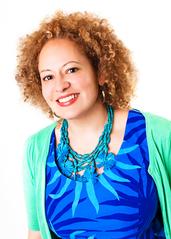
Dr Karlo Mila is a Pasifika poet, writer and researcher of Tongan and Palangi descent. Her PhD focused on the culture, identity and wellbeing of the NZ-born Pasifika population. This identified that acceptance, pride in Pasifika culture and placing importance on Pasifika values was statistically associated with a range of better outcomes for Pasifika young people, especially in the area of suicidality. Her postdoctoral fellowship subsequently involved developing an intervention based on ancestral knowledge, culture, strengthening relationships and increasing resilience for Pasifika young people. Karlo is also a widely anthologised, award-winning poet. Her books are taught in secondary schools and universities in New Zealand and the South Pacific. She currently works for Le Va, an NGO specialising in Pasifika mental health and addictions and suicide prevention. She has recently returned from Hawaii from a Fulbright / CNZ creative writing residency. She lives in Wellington with her two sons, Karlos and Nikolas.
Karlo will talk about ‘Opening our ears to ancestral mentors:' the importance for young Pasifika and Maori to have access to ancestors as mentors - to draw on and re-engage with ancestral knowledge, wisdom, language, worldviews, wellbeing constructs and proverbs - a treasure-house of somewhat marginalized ‘mentoring’ knowledge.